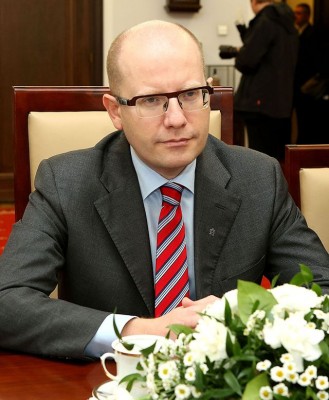Some steps of the Czech government, leaded by social democrat Bohuslav Sobotka, are strange. It is like to paint a house with white color, and then repaint it with black to secure it is not too white. It is like to buy a convertible, and then attach the roof to secure it is not too convertible. It is like to ignite a house and then help to extinguish it…
Neutrality, colorlessness, a compromise of compromises; this exactly summarizes labor market “improvements” that the PM Sobotka has announced in the last week. He informed the minimum wage is going to increase. On the other hand firms in financial problems can ask for a special subsidy called Kurzrbeit (sharing of firm’s wage costs with the state). The first measure is definitely negative for employers. The second one seems to be a great opportunity, but only for chosen lucky employers getting these limited financial resources.
With no doubt, the minimum wage increase is economically negative achievement. It makes a labor more expensive, it threatens low-income households, it intensifies pressure on unemployment and, last but not least, it strengthens motivations for illegal (shadow) employment. If an employee get the recent minimum wage (8,500 CZK), wage costs are much higher due to taxes and contributions to the public finance (namely 11,390 CZK). When the minimum wage increases by seven hundred CZK to 9,200 CZK, employer will have to pay 12,328 CZK in total. It means costs increase almost by one thousand CZK!
The implications are a simple math – imagine you have a cleaning company and you employ 10 people working for the minimum wage. The staff is happy to work for you. Nevertheless a higher minimum wage would please them. After minimum wage increase, your firm’s wage costs come up nearly by 10,000 CZK a month. Fair enough to say goodbye to one employee. Clearly, a higher minimum wage is seemingly fine for employees, however only until the moment one of them has to leave!
Kurzarbeit means the opposite extreme for the Czech labor market. A company in financial difficulties (probably must be connected with the “Russian sanctions”, the law is underway) may ask the state, i.e. all taxpayers, for a partial coverage of wage costs. In practice, it seems to be so that an employee works four days a week for a wage from the employer and one day is at home on the account of taxpayers.
This causes two problems: the first one has been already described. It increases public outlays, not just due to transfer itself, moreover due to more bureaucracy participating in redistribution of money. The contra-argument, i.e. that it would have been maybe more costly for public finances if the employee has been jobless and unable find another job and end on the dole, contains so many “would be” that it makes no sense to deal with. The second problem linked to Kurzarbeit is caused by the fact that someone (One official? Commission of officials? A politician? Commission of politicians?) will decide about highly competitive financial transfer, for which many subjects will apply. There is no space for satisfying all of them. Will this selection be fair? Why Peter does get a subsidy and Paul do not? Well, we live in the Czech Republic, so you know exactly where I’m pointing – a fight against corruption, one of the main priorities of the recent government, should be definitely done by other tools than by creating direct incentives for corruption! Moreover, a question whether Paul does not go bankruptcy, because he cannot compete with Peter, also matters…
A zero plus one dollar, minus one dollar, gives a zero again. However, if we pay some remuneration for this “advanced” math to someone, e.g. to the state, we are worse off. And that is precisely the effect of measures described above. I understand that Prime Minister Bohuslav Sobotka, nicknamed “not-real PM”, wants to demonstrate some activity. However, sometimes it’s just better to do nothing. Markets work best when politicians do not intervene very much…



















No comments
Be the first one to leave a comment.